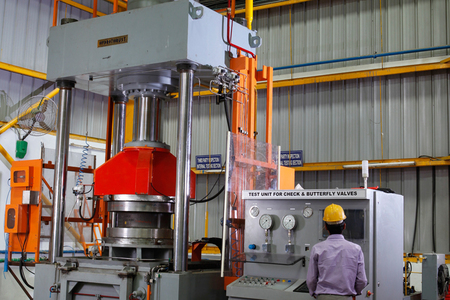How to Choose the Right Industrial Valve Supplier: 7 Critical Factors You Must Know
Choosing the right industrial valve supplier is not only crucial to the smooth progress of a project but also affects the operational efficiency of equipment and subsequent maintenance costs. Today, there are thousands of suppliers around the world claiming to be “professional and reliable,” but finding a partner who can truly deliver on their promises and provide quality and value is not so easy. So how can you determine who is trustworthy? This guide summarizes seven key points to help you distinguish between excellent suppliers and ordinary ones.
1. Technical Expertise and Engineering Support
The foundation of any successful valve supplier relationship lies in technical competence. Leading suppliers like GUANYA Petrochemical Equipment don’t just sell products—they provide engineering solutions. Look for suppliers offering:
- Design consultation services for complex applications
- Material selection guidance based on process conditions
- Custom valve modifications when standard products don’t fit
- Technical documentation including performance curves and specifications
A qualified supplier should demonstrate deep understanding of your industry’s unique challenges, whether you’re in petrochemicals, power generation, or water treatment.
2. Quality Certifications and Standards Compliance
Never compromise on quality certifications. Reputable industrial valve suppliers maintain:
- ISO 9001:2015 quality management certification
- API, ANSI, or ASME product approvals
- Pressure Equipment Directive (PED) compliance for European markets
- Third-party testing documentation from accredited laboratories
These certifications aren’t just paperwork—they represent systematic approaches to quality control that protect your operations from costly failures.
3. Manufacturing Capabilities and Supply Chain Control
Understanding your supplier’s manufacturing depth prevents supply chain surprises. Evaluate:
- In-house manufacturing vs. outsourced production
- Raw material sourcing and traceability systems
- Production capacity and lead time consistency
- Inventory management for critical spare parts
Suppliers with integrated manufacturing operations typically offer better quality control, shorter lead times, and more competitive pricing for large orders.
4. Industry Experience and Client Portfolio
Track record speaks volumes about supplier reliability. Investigate:
- Years of operation in your specific industry
- Major client references from recognizable companies
- Project complexity they’ve successfully handled
- Long-term partnerships with industry leaders
GUANYA’s partnerships with major enterprises like Sinopec, CNPC, and CNOOC demonstrate the trust that industry leaders place in proven suppliers.
5. After-Sales Support and Service Network
Valve procurement doesn’t end with delivery. Comprehensive support includes:
- Installation and commissioning assistance
- Maintenance training for your technical staff
- 24/7 technical support hotlines
- Local service centers for rapid response
- Spare parts availability throughout the product lifecycle
Suppliers with robust service networks minimize downtime and reduce the total cost of ownership.
6. Pricing Transparency and Value Proposition
Smart procurement considers total lifecycle costs, not just initial purchase price:
- Transparent pricing without hidden charges
- Volume discounts for large projects
- Energy efficiency reduces operational costs
- Maintenance requirements impacting lifecycle expenses
- Warranty coverage protecting your investment
The cheapest option rarely delivers the best long-term value.
7. Innovation and Future-Ready Solutions
Leading suppliers continuously innovate to meet evolving industry needs:
- Smart valve technologies with diagnostic capabilities
- IoT integration for predictive maintenance
- Environmental compliance solutions
- Digital documentation and asset management tools
- Research and development investments
These innovations position your operations for future efficiency gains and regulatory compliance.
Making Your Decision
When selecting an industrial valve supplier, there is no perfect answer, only whether it is “right for your project.” List the factors that matter most to you and create a weighted scoring table (e.g., quality 40%, delivery time 30%, after-sales service 20%, cost 10%) to help you make a data-driven decision rather than relying on gut feelings.
Don’t be fooled by the “lowest price”—it is often not the “most suitable.” What’s more important is to find a team that is willing to treat you as a long-term partner.
Next Steps
Before finalizing your supplier selection:
- Before finalizing a supplier, be sure to complete the following steps:
- Request a detailed quotation listing all services
- Visit the production facility in person (if possible)
- Contact their existing clients for background checks
- Review each clause of the contract, including warranty terms and breach of contract responsibilities
- Agree on quantifiable performance metrics for ongoing evaluation
The right industrial valve supplier becomes a strategic partner in your success. Invest time in a thorough evaluation—your operations depend on it.
 Certified vs. Non-Certified Industrial Valve Suppliers: What’s the Real Difference?
Certified vs. Non-Certified Industrial Valve Suppliers: What’s the Real Difference?
 Top 10 Red Flags When Selecting an Industrial Valve Supplier for Your Project
Top 10 Red Flags When Selecting an Industrial Valve Supplier for Your Project
 Evaluate the Specialty Industrial Distributor Company on Valves
Evaluate the Specialty Industrial Distributor Company on Valves




